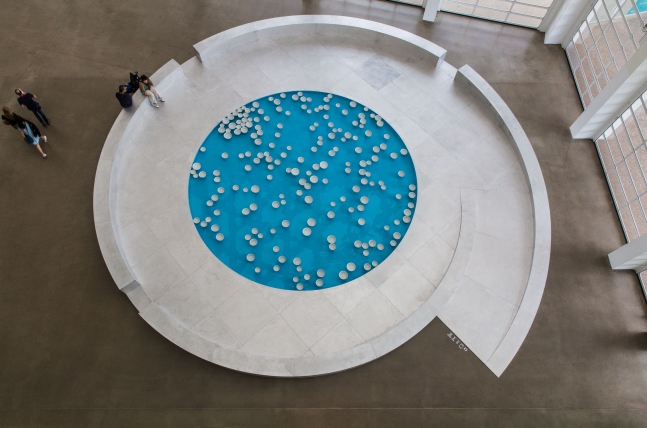Epicurus, Boursier-Mougenot and Silko: Clinamen Swerve and the Freedom of Telling

Though atoms fall straight downward through the void
by their own weight, yet at uncertain times
and at uncertain points, they swerve a bit –
enough that one may say they changed direction.
– Lucretius (II 217-220)
This was meant to be a tiny minor post and sadly I have another one in its draft stage for Silko because this novel is just so good but if I didn’t write this down I’d lose it in the chasms of my mind. Despite the book being brilliant I did struggle with the multiple threads of narrative that comprise the totality (if one can say totality in this case) of the novel. In my other post (which will probably be very, very rough) I reckon I’ll be looking at this novel in relation to James Lovelock’s Gaia Hypothesis, offering a more eco-feminist reading of the novel and its emphasis on balance and interrelation. Yes clinamen can mean bias but in the atom theory of Epicurus, it is the ‘swerve of atoms responsible for introducing indeterminacy into an otherwise deterministic system’. Unlike Democritus who argued atoms fell with unvarying linearity producing causal patterns which determine almost everything from physical phenomena to how humans think and act, Epicurus suggested atoms swerve occasionally, freely and randomly. Really what he is refuting is linearity. I mean I suppose every text on this course could be read as a clinamen text but I think this is more relevant to Silko’s novel than any other. Maybe we can understand all the various narrative elements as moving atoms swerving, shaping and redirecting the singular units of story to produce a story of swerve in which chance and interrelation are the principle structuring mechanisms. It seems appropriate as well that this book is a book of active ‘ceremony’ not linear testimony, that language here is enacting rather than merely describing or ordering. Now what is interesting is the political dimension of clinamen theory, because it strongly emphasises free-will whilst simultaneously erupting notions that anything is ever merely singular. In this way then Silko’s novel can be read as having a political dimension, of advocating against the conformism and derision of novelistic tradition by offering an alternative means of communicating and passing down stories.
Let me just draw attention to the image which is an art installation by Céleste Boursier-Mougenot labelled (yep, you guessed it) – Clinamen. Now what I love about this is that he uses sound, space and movement to immerse viewers in a textured experience as to invite renewed and refined appreciation of our environment and our perceptual/experiential reality. There is a strong emphasis on rhythms and fluidity, so that the many bowls in the water move gently as to collide occasionally to create a momentary chime of sound (meaning) but what’s so significant is that the different bowls and the water create a specific effect through how they interrelate. I think maybe we can understand Silko’s novel in the same way, as an alive and rhythmic body of linguistic and sonorous water in which units of story merge, collide and interrelate to create an overall impact, a sound, a voice from the silence. Words alone have their own stories but when given breath they become alive, changing and mutable entities that forge new stories. Hmm…. more to be said but that’s enough for now.
Here is Silko’s novel in action as I see it – had a good laugh with my flatmates as this installation is also applicable to our one flatmate that gets drunk and comes home at 5am and decides to unpack the dishwasher with an astounding unawareness of the noise she makes – https://www.youtube.com/watch?v=7Vhf00SzLM8
Max Richter is one of my favourite composers and he did the music for Woolf Works which I watched ages ago and was transfixed by this 30 second soundtrack; I love the sound of spoken word against music. I mean I adore this quote but I think a really interesting reading could be produced by comparing Woolf and Silko, for whilst they are very different, there are illuminating points of comparison. I also think memory is so crucial to Silko’s novel and the way it functions as a ‘seamstress’ which ties past and present together but also a capricious force which distorts, loses and struggles to make sense and meaning of the past and present. Memory is, as always, the most fascinating thing ever…
‘Memory is the seamstress and a capricious one at that … we know not what comes next or follows after, thus the most ordinary movement in the world… may agitate a thousand odd disconnected fragments now bright, now dim, hanging and bobbing, dipping and flaunting’ – sends shivers up my spine. Maybe we ought to see all these disconnected fragments as a moving whole, ever-evolving (as Glissant would say – an open totality which opens upon itself)
****Lol right, just to clarify I’m not on drugs, but there was a point at which I was trying to argue that Silko’s novel could be understood as a jellyfish. Bear with me- as in the notion of the novel’s voice as the head thing (like the big part of the jellyfish..) and then all the little subplots as the interweaving tentacles that merge and mix but which semi-propel the jellyfish forward – and then I was like, wait a sec do jellyfish just get carried with the tide and thought that seemed appropriate too but seemed to also go against my prior conceptualisation. Anyway went with clinamen instead though I wish I could give a tentacular reading of her book***




Recent comments